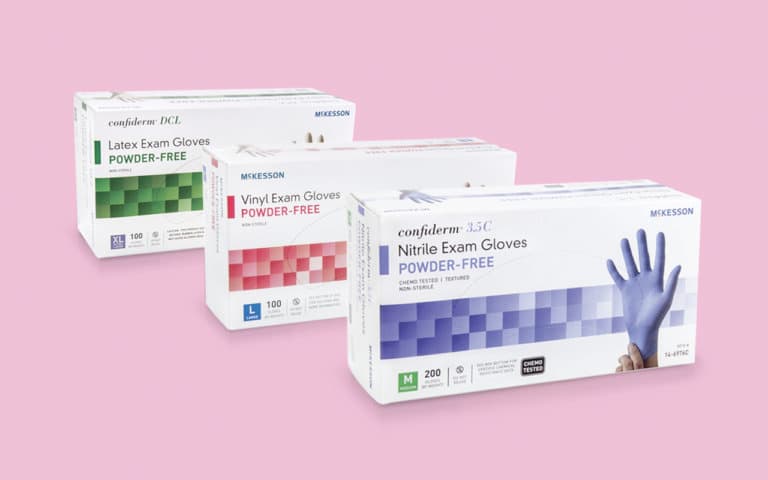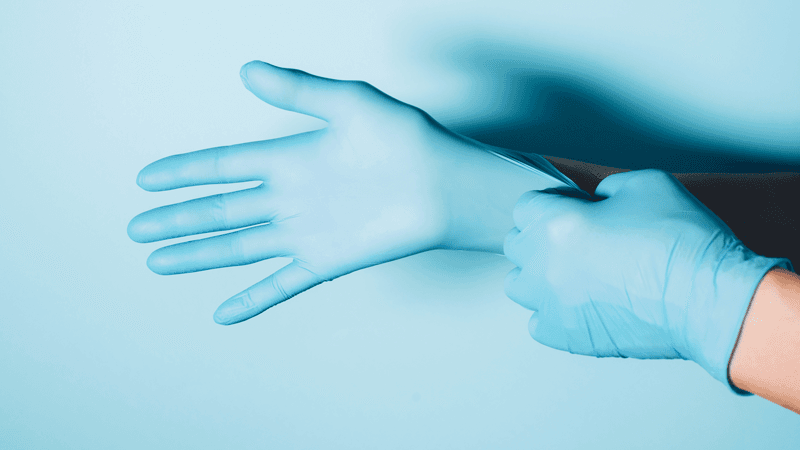Vinyl vs Nitrile vs Latex Gloves

Verified by Kiera Powell, R.N. and written by Chad Birt on Tue Jul 13 2021.
Medically Verified

Many caregiving responsibilities require medical-grade gloves. Gloves protect you and your loved one’s skin, reduce the risk of microbial contamination, and provide a more sanitary environment. But if you’re a new caregiver, it’s normal to wonder about the difference between vinyl vs. nitrile vs. latex gloves. These glove materials look similar, but they offer different strengths and weaknesses. To make the research process a bit easier, we’ve compiled a helpful guide.
What’s the difference between vinyl, nitrile, and latex gloves?
Vinyl, nitrile, and latex gloves are all considered medical-grade, but they have unique features.
Vinyl gloves
Vinyl is a synthetic polymer derived from petroleum. It’s latex-free, affordable, and used in dozens of applications. Vinyl gloves can be found at nearly any retailer, but they aren’t ideal for caregiving. That’s because they’re less durable than nitrile or latex gloves and provide limited protection against chemicals, bacteria, and other microbes.
Shop Vinyl Gloves
Nitrile gloves
Nitrile is a type of synthetic rubber. It’s incredibly durable, latex-free, and specifically designed for medical applications. Nitrile gloves were first developed during the early 90s’. Since then, they’ve become the go-to glove for many doctors, nurses, and home caregivers. Nitrile gloves are unique in that they tear easily. This feature makes it simple to tell if a glove (or pair of gloves) is compromised.
Shop All Nitrile Gloves
Latex gloves.
Latex gloves are made of rubber. They’re comfortable, can be used for medical applications, and encourage optimal finger dexterity. The only real downside is they’re made of latex. Researchers estimate more than 1% of Americans suffer from a latex allergy. If your loved one is one of these individuals, make sure to use nitrile or vinyl gloves instead.
What are the pros and cons of each type of glove?
Now that you know a little more about the different types of gloves, let’s take a closer look at their pros and cons.
Pros and cons of vinyl gloves:
| Pros | Cons |
|---|---|
| Latex-Free: Safe for individuals with latex allergies. | Loose Fit & Comfort: Can feel baggy and less comfortable, potentially hindering dexterity. |
| Cost-Effective: Often the most affordable glove option, ideal for high-volume, low-risk tasks. | Limited Breathability: Can cause hands to sweat, leading to discomfort during extended use. |
| Waterproof: Provides a reliable barrier against liquids. | Low Chemical Resistance: Not suitable for handling hazardous chemicals or strong disinfectants. |
| Allergen-Allergen-Free: Generally free from common allergens. | Lower Durability: More prone to tearing, puncturing, and breaking compared to other glove types. |
| Ideal for Non-Hazardous Tasks: Suitable for light-duty, non-medical examinations or general cleaning. | Reduced Tactile Sensitivity: The thicker, looser material can decrease sensitivity. Export to Sheets |
Pros and cons of nitrile gloves:
| Pros | Cons |
|---|---|
| Latex-Free: Safe for individuals with latex allergies. | Higher Cost: Generally more expensive than vinyl or latex gloves. |
| Excellent Fit & Comfort: Molds to the hand for a snug, comfortable fit, enhancing dexterity and tactile sensitivity. | Less Biodegradable: Not as environmentally friendly as natural rubber latex gloves. |
| High Durability: Strong and resistant to punctures, tears, and abrasions, making them suitable for prolonged use. | Limited Stretch/Elasticity: Can be less flexible than latex, potentially making them harder to don if not properly sized. |
| Chemical & Microbial Resistance: Provides superior protection against a wide range of chemicals, pathogens, and bodily fluids. | |
| Visible Tear Detection: Tears are often more noticeable (e.g., a visible rip or hole), making it easier to identify compromised gloves. | |
| Widely Preferred: A popular choice for disposable gloves in various professional settings, including healthcare. |
Pros and cons of latex gloves:
| Pros | Cons |
|---|---|
| Excellent Fit & Dexterity: Conforms snugly to the hand, offering superior tactile sensitivity and dexterity. | Allergic Reactions: Can cause allergic reactions (Type I and Type IV) in sensitive individuals. |
| High Elasticity & Strength: Very stretchy and strong, providing good resistance to punctures and tears during use. | Poor Chemical Resistance: Not recommended for handling many chemicals, as they offer limited protection. |
| Cost-Effective: Often more affordable than nitrile gloves. | Degradation with Oil/Grease: Can degrade and lose integrity when exposed to oils or petroleum-based products. |
| Biodegradable & Eco-Friendly: Derived from a natural source (rubber tree sap), making them more biodegradable than synthetic options. | |
| Versatile Use: Ideal for a wide range of tasks, including diaper changes, wound dressing, and general cleanup. | |
| Medical Industry Standard: Historically considered a benchmark for medical examinations and procedures due to their barrier protection. |
In what situations should I use vinyl vs. nitrile vs. latex gloves?
The type of gloves that will most benefit you and your loved one depends on their individual needs and your caregiving responsibilities. As a general rule, we recommend the following:
Vinyl gloves: Since vinyl gloves contain more elastic than nitrile or latex, they tend to fit loosely. Avoid wearing them when changing diapers, providing bathing assistance, or helping your loved one use the toilet. Vinyl gloves are ideal if you’re on a tight budget, only need to wear gloves for a few minutes, or need to cover your hands while preparing snacks, drinks, or meals.
Nitrile gloves: When it comes to caregiving, nitrile gloves are considered the “gold standard.” Because they’re free of allergens like latex, there’s less risk of skin irritation, or in severe instances, anaphylaxis.
Nitrile gloves fit your hands comfortably and encourage finger dexterity. That makes them ideal for cleaning and sanitation as well as tasks that require gripping, twisting, or lifting. When you’re finished wearing a pair of nitrile gloves, remove and toss them in the trash. Thanks to advances in manufacturing, many of the nitrile gloves currently on the market are biodegradable.
Latex gloves: Latex gloves are just as comfortable as nitrile, but because they’re made of latex, present the risk of an allergic reaction. They’re safe for use in almost any caregiving situation, as long as your loved one doesn’t suffer from a latex allergy.
What type of glove is most affordable?
The price of gloves varies depending on the brand and the materials used. Generally speaking, vinyl is most affordable, followed by latex, and then nitrile.
When selecting gloves, it’s important to remember that price isn’t the only factor to consider. Even though nitrile gloves are more expensive, they’re incredibly versatile and provide long-lasting protection from chemicals and microbes. If your daily responsibilities include changing diapers, sterilizing catheters, or administering enteral or parenteral feeding, invest in high-quality gloves that hold up.
Frequently Asked Questions: Vinyl vs. Nitrile vs. Latex Gloves
Which is better, vinyl or nitrile gloves?
In caregiving situations, nitrile gloves are typically better than vinyl ones. Even though vinyl gloves are relatively affordable and latex-free, they offer limited protection from chemicals and microbes. Nitrile is more durable and comfortable. What’s more, nitrile gloves are specifically designed to withstand exposure to chemicals and bodily fluids.
What are nitrile gloves made of?
Nitrile gloves are made from a synthetic material called acrylonitrile-butadiene rubber. It’s chemical resistant and capable of withstanding exposure to various substances, including mineral oils, acids, and topical medications.
Are nitrile gloves latex-free?
Nitrile gloves are made from synthetic rubber that’s free of latex. Even so, about 1% of users experience an allergic reaction, such as hives or itching. If you’ve recently made the transition from vinyl or latex gloves to nitrile gloves, and you have a history of allergies, watch for signs of potential irritation.
Are vinyl gloves safer than nitrile?
Vinyl gloves are cheaper than nitrile gloves, but they aren’t necessarily safer. In fact, they’re probably less so. Vinyl gloves fit loosely, are prone to tears, and offer limited protection against chemicals and microorganisms.
Vinyl vs Nitrile vs Latex Gloves Comparison Table
| Feature | Vinyl Gloves | Nitrile Gloves | Latex Gloves |
|---|---|---|---|
| Latex-free | Yes | Yes | No |
| Waterproof | Yes | Yes | No |
| Chemical Resistant | No | Yes | No |
| Microbial Resistant | No | Yes | No |
| Bidegradable | No | Yes | Yes |
| Safe for Food Prep | Yes | Yes | Yes |
| Safe for Medical Applications | No | Yes | For those without latex allergies |
| Cost | Cheapest | Most expensive | Mid-range |
Other Articles You May Like

The Best Disposable Gloves of 2025
Disposable gloves have gained notoriety due to the covid-19 pandemic, however, they are also an essential item in any caregivers’ toolkit. See our three top-quality gloves.
Read More >
Checklist of Helpful Products For Heavy Incontinence
Use this heavy incontinence checklist of helpful products that can support your loved one and help you keep them and their environment clean and healthy.
Read More >
Chad Birt is a freelance medical writer who resides in Astoria, Oregon. When he isn't behind a keyboard, you can find him hiking, camping, or birdwatching with his wife Ella and their two dogs, Diane and Thoreau.